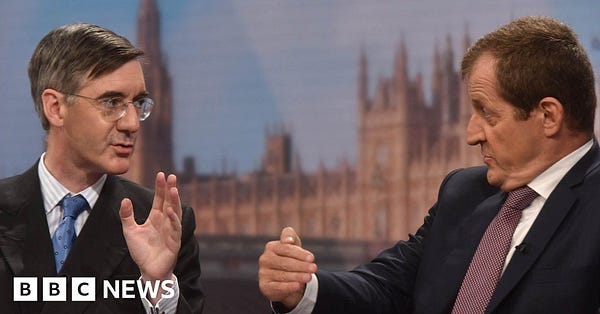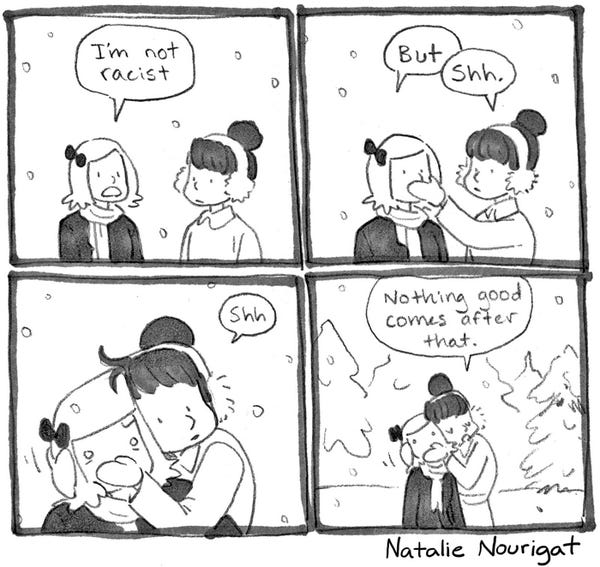Why I'm still talking to white people about race
How does a Medway councillor get to talk unchallenged about 'coloured' people in a public meeting?
In January we reported about a Medway Council Children and Young People Scrutiny Committee meeting that discussed ‘tackling racism in our schools’. During the meeting, events took a surprising/unsurprising (delete as you see appropriate) turn when the discussion instead moved onto anti-white racism, coloured tutors, and no one challenging these concepts being discussed.
So this week, let’s talk about racism. We’ll attempt to understand what is ‘woke’, what’s wrong with saying ‘coloured’, why aren’t we doing more to tackle white racism, and why we still believe in white privilege when there are so many white children underperforming in our schools. Yes, this definitely sounds like a week where people will smash those like and subscribe buttons.
For context, you can watch the whole committee meeting here, or go to 2:15:00 to see the specific part we’re going to focus on.
Equality and Diversity training is held as part of Medway Council’s councillor induction programme. However, it is not mandatory and when asked, Medway Council would not confirm if 2019’s new councillors attended the induction programme or the non-mandatory equality and diversity training. The training was facilitated in-house, so the easily outraged amongst you will be disappointed to hear that there was no cost. Though, if you are inclined to get angry about this sort of thing, we can report that since April 2019 the council has spent £6,770 on Equality and Diversity training and conferences. If you’d like to read Medway Council’s Equality Policy, it’s part of a document called the Fair Access and Inclusion Policy. Though it states it is from 2012, Medway Council assures us it is reviewed annually and that in April 2023 there will be a new version uploaded as part of the new Diversity, Equality and Inclusion Strategy.
Let’s talk about being ‘woke’.
Not because it was brought up in the meeting, it wasn’t, but because - as we move towards local and General Elections - ‘wokeness’ will get brought up again and again by those who seek to create a culture war. This acts as a means to galvanise an electoral base, who are otherwise put off by poor economic performance, terrible covid outcomes and losing out on the benefits of Brexit.


Woke is a form of African-American vernacular English, or slang, from the 1940s and was first used to literally mean becoming ‘woken up’, or sensitised to issues of justice. It was repopularised following the Black Lives Matter protests at the turn of the decade, before which it was hardly used in the United Kingdom. It started to be used by people on the left to highlight progressivism. Then it was weaponised by the right to denigrate.
Without any sense of irony or shame, predominately white right-wing commentators, bloggers and armchair golliwog enthusiasts performed cultural appropriation rather than accept that nobody was saying “white lives don’t matter”. It’s now used anytime they get angry and upset because somebody has asked them to be kind. And really that’s all being woke is: being kind. Stupid kind bastards.
As our January piece highlighted, the term coloured was used unchallenged, and really, haven’t we all got bigger issues to worry about? The reality is problem lies in the casualness with which the term is used, and the ease with which some dismiss it as an issue. It recalls a time when racism was a part of everyday life. The progressives amongst you would like to have moved on from this, whilst the regressive harken back to it.
The offensiveness is from the implication, intentional or otherwise, that white is the default. Sanjay Bhandari, chairman of football anti-racism group Kick It Out, highlighted the generation gap when using the term ‘coloured’:
“His use of outdated language to describe Black and Asian people as ‘coloured’ is from decades ago and should remain consigned to the dustbin of history.”
The changing world is scary for some who harken back to the glory days of the Empire and are outraged by the idea that there are any reparations due, let alone not being allowed to call ‘a spade a spade’. White people may say that they had no idea that ‘coloured’ was offensive, and that they are unable or unwilling to see the difference between ‘coloured’ and ‘people of colour.’ They may feel frustrated that the goalpost for what is appropriate to call black people keeps moving.
Indeed, what is acceptable for white people to call black people to call themselves has evolved as people sought to redefine themselves and their place. Now, ‘people of colour’ is used to refer to the collective group of non-white. It is offensive to single blacks out as ‘coloured.’ While the distinctions can be complicated, the information is readily available for anyone willing to seek it out. That means reading and having meaningful conversations with people of different races. The problem is that many white people aren’t willing to work that hard.
It is much easier to complain about how unfair it is that white people can’t use the term ‘coloured’, whilst people of colour have long baulked at the idea that they have an obligation to explain race to white people. It’s their right to refuse to try and educate white people about what it means to be black, brown or yellow. Which is why it was the prerogative of some non-white councillors at the meeting to not speak up.
In a scene in the 2014 film Dear White People, one black character says to another,
“Black people can’t be racist. Prejudiced, yes, but not racist. Racism describes a system of advantage based on race. Black people can’t be racist since we don’t stand to benefit from such a system.”
Whilst Dr Pragya Agarwal, author and behavioural scientist wrote:
“White people can indeed face stereotypical assumptions based on their skin colour and hence encounter racial prejudice. But this cannot be called racism, because of the inherent systemic imbalance of power between those with lighter skin colour and people of colour. Racial prejudice can affect people on an individual level, but it would not have the same effect on a larger social and cultural level because it is only when stereotypes are bolstered by power, such as through a eurocentric model of thinking, that it creates systemic and structural racism and oppression that people of colour have encountered throughout history.”
This is what some have difficulty dealing with. They see their own lack of power as evidence of racism towards themselves. They rebuke the term ‘white privilege’ because they see no privilege in their lives. They find comfort in hitting down and not up because they simultaneously live in a class-based society where they have been told that "we are all middle class now."
This was said by John Prescott before the 1997 General Election, neatly summing up Tony Blair's "big tent" philosophy. According to a report published in August 2014 by the Social Mobility and Child Poverty Commission:
The 7% of the population educated in the UK’s private schools provide 20% of our university vice chancellors, 22% of chief constables and FTSE 350 CEOs, 26% of BBC executives, 33% of Members of Parliament, 43% of newspaper columnists, 44% of people in television, film and music, 45% of the chairs of public bodies, 50% of members of the House of Lords, 53% of diplomats, 55% of permanent secretaries, 62% of senior officers in the armed forces, and 71% of senior judges.
We aren’t all middle class.
Yes, more have gone to university, more hold office-based jobs, and more people eat avocado on toast. However with average household incomes of £13,000 for the ‘traditional working class’, and £21,000 for the ‘emergent service sector’, all of which have low to non-existent savings. This means more and more people are demanding to know where is the future they were promised. Like a futurist demanding ‘where’s my fucking hoverboard?’
Recognising white privilege begins with understanding it, which again can take effort. The effort you might rather spend being angry with a ginger prince for falling in love with a black actress.
Peggy McIntosh’s groundbreaking essay White Privilege: Unpacking the Invisible Knapsack was published in 1988. It helps readers recognise white privilege by making its effects tangible. For many, white privilege can be an invisible force. It is being able to walk into a store and find that the main displays of shampoo cater toward your hair type, or being able to turn on the television and being widely represented. It was being able to move through life without being racially profiled. White privilege doesn’t mean that you do not have a tough difficult impoverished life if you are white. Just that it is unlikely it has happened because of it.
‘Forgotten’ White working-class pupils let down by decades of neglect, MPs say is quite an attention-grabbing headline. And grab attention, it did. A clear example of how the education system is ‘racist’ towards white people. Except, there’s a key detail missing from the headline, that the first paragraph does mention:
highlights how White British pupils eligible for free school meals (FSM) persistently underperform compared with peers in other ethnic groups
The issue isn’t that they are white students, it’s that they are poor. It’s easier to get angry at straw men than mad at a government that cuts more than £1m in real-terms spending on free school meals for the youngest pupils. Analysis of government data has shown how this starved vast sums of money from Essex, Kent, Hampshire and Hertfordshire. Whilst some vilified footballers for taking the knee and getting involved with politics, it was one young black sports star who stood up and made the government change their plans.
Footnotes
If you’ve made it this far, thanks for subscribing. Maybe click the like button. Or leave us that comment about how wrong I’ve been.
Steven Keevil is still enjoying building his Optimus Prime Lego, he is now almost finished. He is currently recuperating from the overstimulation of watching the entire Magic Mike film trilogy in one weekend. He was a co-founder of The Political Medway and still manages to watch hundreds of films a year. He highly recommends Paris, 13th District.
Steven obviously listened to Dear Science by Seth Sentry whilst writing this, and he absolutely recommends you read Why I’m No Longer Talking To White People About Race by Reni Eddo-Lodge.






Great piece.
Great read. Hope that the local elections bring a younger generation with more progressive attitudes to the Council...